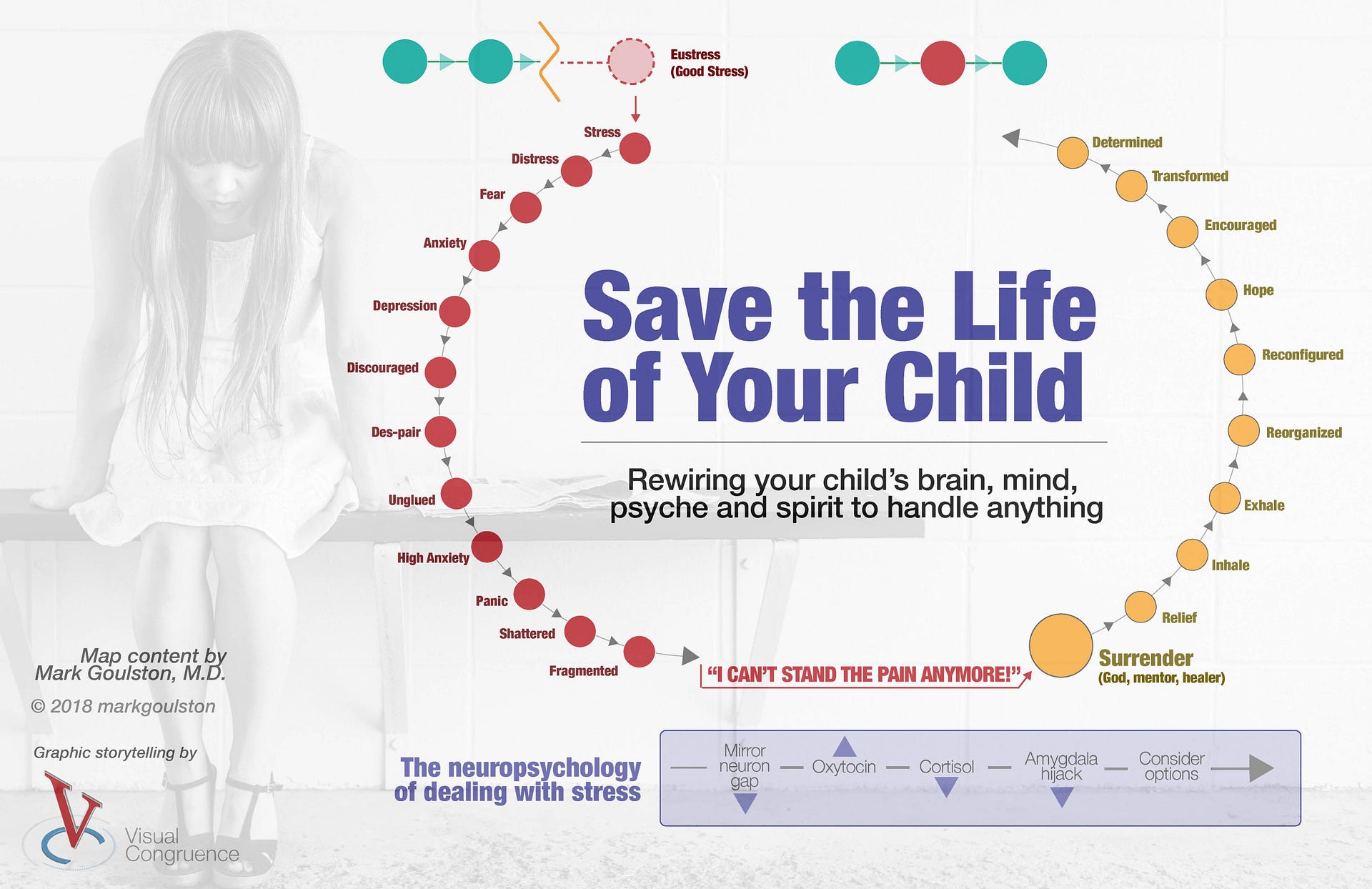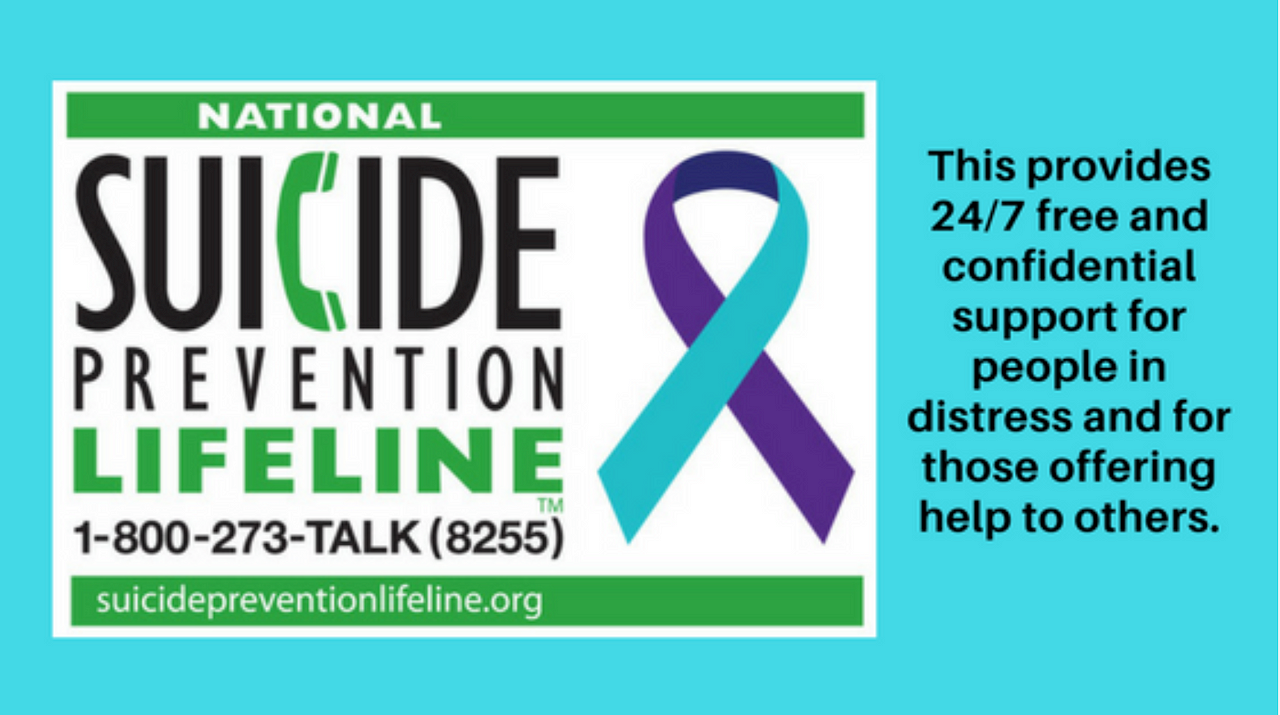Visit #stayalivenow and http://youtube.com/stayalivevideo
If you or anyone you know has been touched by suicide and are feeling isolated, visit our compassionate, supportive touched by suicide community on Twitter (>2.6+ million impressions)
What follows is a redacted exchange between a caller and a hotline volunteer using targeted interventional empathy as well as the Seven Words. It is not to second guess or to replace the tireless work and caring provided by mental professionals and the many selfless suicide hotline volunteers who handle the calls. It is offered so that everyone who cares about helping people that are feeling suicidal — including parents and teachers and coaches — might have an additional tool in their tool kit to do so.
Caller: I feel like ending it all.
Hotline: Say more about “ending it all.”
Caller: I can’t take it anymore, I’m just so depressed and feel like it’s never going to get any better and I can’t think of any reason to live.
Hotline: Pick one and tell me more.
Caller: Huh?
Hotline: It sounds like you feel as though you “can’t take it anymore” and are “just so depressed” and “like it’s never going to get any better” and you “can’t think of any reason to live.” Pick one or all of them and say more about it. Oh, and by the way, please tell me your name and give me your telephone number in case the line drops and I lose you. Those are things we always have to ask for.
Caller: My name is Michelle and I don’t want to give you my number (and the hotline volunteer couldn’t pick up her caller ID). I can’t think of any reason to live. I seem to mess up everything, my parents are disappointed in me and tell me I’m just being dramatic, and I’m so angry at them. But mostly, I just don’t care anymore about anything.
Hotline: Really… (said in an inviting “tell me more” tone)
Caller: Yeah, and it hasn’t just been a bad day, it’s been going on for weeks. I think my friends are also sick and tired of hearing from me. I’m just a burden to everyone, so I think it’s much better if I just ended it.
Hotline: Michelle it sounds like you think it’s much better if you just ended it.
Caller: Yeah, that’s right.
Hotline: And then you called us, which I’m glad you did. What was going on just before you called us?
Caller: Well I’ve got the pills to do it, and I’m very close to doing it.
Hotline: Say more about “very close to doing it.”
Caller: I’ve taken them out of the bottle and I’ve been looking at them.
Hotline: When you look at them, what do you see and feel? And also what kind of pills and how many?
Caller: That they will make everything go away. They’re oxycodone that I found in my parents bathroom and about twenty.
Hotline: What do you mean by “make everything go away?”
Caller: The pain I feel.
Hotline: The pain about what?
Caller: Everything about my life hurts.
Hotline: Michelle, that reminds me of eight words.
Caller: What?
Hotline: Seven words that are related to that pain.
Caller (confused): What do you mean, “Eight words?”
Hotline: Anxious, depressed, afraid, angry, ashamed, alone, lonely, tired. Pick one and tell me about that.
Caller (laughing): How about all of them?
Hotline: I’ve got all the time you need as long as you haven’t done anything yet with the pills and then surprise me by going unconscious.
Caller: No, I haven’t taken them yet. Okay, here’s one, “alone.”
Hotline: I thought you might be feeling that, say more about “alone.”
Caller: Every day when I wake up, the day takes forever especially when I have nothing to look forward to. And when I get home, my parents are tired of my moodiness. And I just feel alone with it and then my mind just goes crazy.
Hotline: Say more about you just feeling alone and your mind going crazy.
Caller (starts to cry): I feel cut off from everyone and that nobody understands or wants to understand how I feel. And every time I start to talk about my feelings at home, my mom will listen for a little time and then I can see that she’s overwhelmed and that I’ve just burdened her more. And then my mind just pulls at me and I feel like smacking my head with a fist.
Hotline: So, you feel like you’re a burden to her.
Caller: Hey, I’m a burden to everyone and anyone in my family who tells me I’m not is lying. Hey, I’m a burden to myself, so killing myself will just relieve the world of being burdened by me.
Hotline: You said you also felt alone with all of that. Say more about feeling alone.
Caller: I guess I was really feeling alone after the first week of school. I thought it was going to be a chance for a new beginning, but it’s just a continuation of my awful year last year.
Hotline: What happened in the first week that made you feel so alone and what about your awful last year?
Caller: It was after my first week of school and it was actually hurt, afraid, angry and then feeling all alone with it. I ran into some ex-friends, who were giving me a hard time at the end of last year and just started up where they left off last June.
Hotline: Tell me exactly what happened?
Caller: As soon as I got back to class…
Hotline: By the way, how old are you and what grade are you in?
Caller: 15 and 9th grade. Yeah as soon as I got back to class, they started in with the names, “Stupid,” “Bitch,” “Ugly,” “Loser,” and the list goes on.
Hotline: Which of those names hurts you the most?
Caller: “Loser” because it’s true.
Hotline: At its worst, how bad are you capable of feeling?
Caller (irritated): Hey, I’m calling you that I don’t want to live anymore. What the f — k do you think?
Hotline: So right now?
Caller: Yes! But… (pauses)
Hotline: But what Michelle?
Caller: It does feel a little better talking to you. Sorry I snapped at you.
Hotline: About the snapping, it’s okay. After all you did say that you’re at the end of your f — king rope, didn’t you? What do you mean you feel a little better talking to me?
Caller: Not those exact words, but you get the picture. I guess you’re listening is helping me feel less alone.
Hotline: Let’s keep doing that and see if it helps you feel even better. How about the rest of the eight words which were: anxious, depressed, afraid, angry, ashamed, lonely and exhausted. Pick another one and tell me about that.
Caller: Okay. By the way, my number is: 818-xxx-yyyy.
And so, the conversation continues with the Michelle calming down considerably and sharing many other things she has done to deal with her psychic pain including cutting herself, going to psychologists that she says hasn’t helped, talking about how much it is costing her family money they don’t have, etc. The more she speaks and the more she feels felt, the more she cries, the less alone she feels and the more relief she feels. Gradually Michelle and the volunteer are able to come up with a plan that Michelle is able to follow.
What happened in the call above and why was it effective?
In the above example, the hotline volunteer did follow a protocol in asking for Michelle’s name, age, grade, phone number. However, the volunteer made making an empathic connection the highest priority.
The volunteer also made note of emotionally laden words and each time the volunteer heard one, she asked Michelle to specifically say more about them. Every time Michelle got more specific about her emotions, she was reliving them and sharing with the volunteer times and events that she previously had only felt alone. Doing that helped Michelle feel less alone.
Following that, the volunteer instead of asking Michelle if she felt any of the eight words — anxious, depressed, afraid, angry, ashamed, alone, lonely, tired — assumed she was, and gave her the words to choose from.
She could have asked about whether Michelle was feeling any of those words, however asking about those words runs the risk of being experienced as confrontational.
You can appreciate that experience yourself when someone asks you, “Are you angry?” which may cause you to become defensive.
Instead of putting them on the spot with a question, when you give another person the words in a non-judgmental manner you are giving them your understanding as you say it and validating that they’re not wrong to feel any of them.
This had the effect of Michelle feeling increasingly felt by the volunteer. As Michelle “felt felt,” she felt less alone and as she felt less alone, she occasionally cried with relief.
The more she cried with relief, the calmer she became and the more she could begin to listen to what the volunteer was saying.
There is some neuroscience behind this that you might find interesting.
The neuroscience is that when Michelle called, she was in a state of high distress. That meant that her cortisol — a stress related hormone — was high and her blood was flowing more to her emotional middle and “fight or flight” lower survival related brains. This coincided with a part of her middle emotional brain called the amygdala “hijacking” her away from being able to access her upper reasoning brain.
The more Michelle “felt felt,” the more another hormone called oxytocin, which is related to bonding (and is highest when mothers bond with newborn children), went up. When oxytocin becomes elevated, it lowers cortisol, the amygdala settled down and there was an increased blood flow to the upper thinking part of Michelle’s brain.
This led to her being able to engage in a conversation and cooperat, which is why she gave the volunteer her phone number.
If the above interests you and you would like to learn more about our keynotes and workshops for counselors, parents and coaches for intervening with people who are feeling suicidal which you can find out more about by contacting us at: [email protected] .
If you are a parent or teenager, use the video below as a catalyst for having a deeper conversation about your teenager’s feelings or your feelings if you are that teenager.
Also use the infographic below to have a conversation with a depressed or suicidal child you are worried about and have him/her talk about any of the feelings he/she might be having. The “surrender” part is about you not rushing in with a solution or advice, but staying in that space with your child with non-judgmental compassion.

Also:


